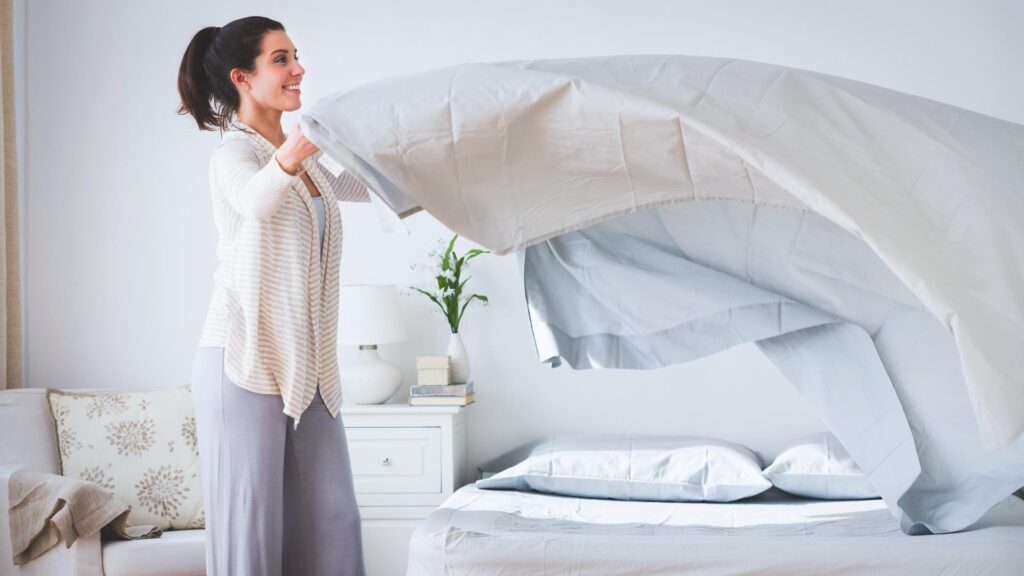Sleep Talk Blog, Health & Wellbeing
The Psychology Behind Tidying Your Bedroom -The Definitive Advice Guide
Some days you can wake up with your mind in a mess where you might feel anxious, stressed, and depressed. It sets you up for one of those days and is incredibly frustrating because it happens without cause or reason.
The question is, how can you snap out of it? Try tidying your bedroom first thing in the morning. Yes, seriously!
Research shows that cleaning (or a lack of) can impact your mental and physical health. Tiding your bedroom is a quick win for your anxious and stressed mind, and a tidy bedroom also gives you somewhere to de-stress.
Tidying your bedroom improves self-efficacy.
Tidying your bedroom is great for your mental health. It gives you a quick win, triggering your brain’s reward system, and it puts you in a productive mood, giving you the energy and motivation to get things done.
There’s a concept in psychology called self-efficacy, which refers to a person’s sense of their capacity to execute behaviours. It is considered the foundation for motivation, well-being, and personal accomplishment.
People with a high sense of self-efficacy are confident achievers, while people with low self-efficacy are fearful avoiders of most things.
This is an important concept as to why you wake up in a bad mood; it is linked to self-confidence, which is linked to your performance in handling things. If you have low self-efficacy, you are more likely to be fearful and stressed.
You can improve your sense of self-efficacy by achieving purposeful things, and one of those things is tidying your bedroom.
Tidying your bedroom or even just making your bed first thing in the morning will make you feel good and set you up for a productive day.
Tidying your bedroom is good for your health.
Clutter, mess, and things in places they shouldn’t be are annoying, but they can also negatively impact your mental and physical health.
A tidy bedroom can save you time and de-stress you by making it easy to find things, and being orderly and uncluttered is also known to elicit a positive effect on anxiety.
Many people find cleaning satisfying; hoovering a floor and seeing the dirt disappear is therapeutic in today’s hectic world.
A study by Indiana University also found that people with tidy homes are more likely to be physically healthy. Taking thirty minutes to clean positively impacts physical health, so getting the hoover out is good for you!
The WHO attributes 3.8 million premature deaths annually to household air pollution, and air purifiers are the best solution.
If you have depression, cleaning can also improve your mood. Cleaning takes your mind off things and makes you feel accomplished something. Also, a dirty house tends only to reinforce negative thoughts and feelings.
How to tidy your bedroom the right way
Here’s how to clean your bedroom properly:
- Open a window.
- Make your bed: Firstly, make your bed or strip it and put on new bedding. Once your bed is tidy, the focal point of your bedroom will have orderliness.
- Tidy up: put things Where they should be, throw out any rubbish, and de-clutter to make your bedroom as neat as possible.
- Dust everything down: Take a damp microfibre cloth or a dry dusting cloth and wipe down all hard surfaces -- don’t forget about your ceiling light and door frames.
- Hoover up: Once your floor is clean and you’ve dusted, hoover up and use the edge attachment to get into all the nooks and crannies.
- Spray a natural air odour neutraliser: Avoid sprays laced with chemicals, or else you might give yourself and your pets a sneezing fit.
- Get an air purifier: Air purifiers are plug-in devices with a HEPA filter that removes dust from the air and reduces odours.
Overall, tidying your bedroom is good for your mind and body. Why not give it a go and see if it works for you? If anything else, at least your bedroom will be clean!

